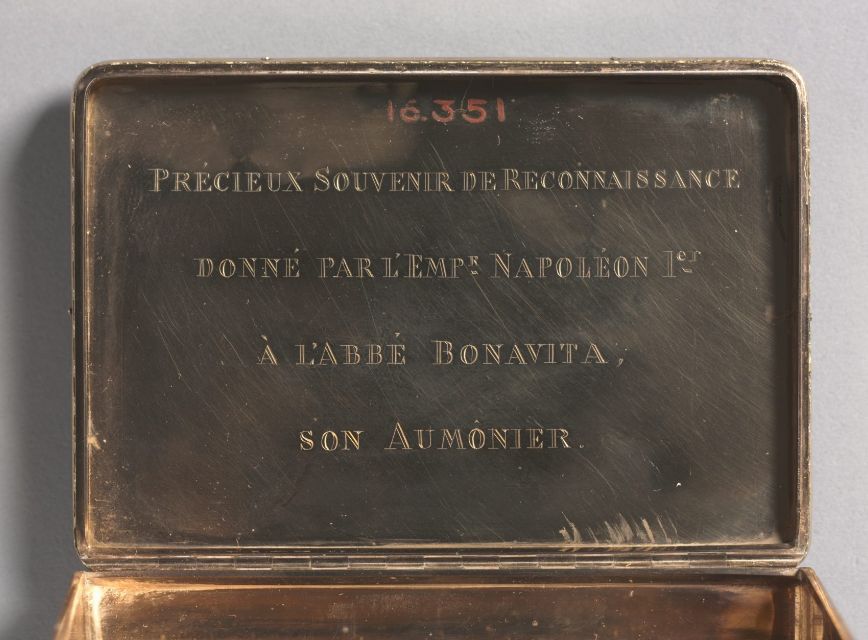Box of Loyalty
- Box with Portrait of Napoleon I
When opened, this box reveals an inscription that reads: “precious souvenir of recognition, given by Napoleon the 1st to Father Bonavita, his chaplain.” As a personal gift from Napoleon to his chaplain and fellow Corsican Antonio Bonavita, this ornate box celebrated a personal bond of loyalty.
Why would Napoleon give such a valuable gift to one of his priests? Who was this priest? Antonio Bonavita - born in 1752 in Petralba, northern Corsica, France - died on 2 November 1833 in Mauritius. As the personal chaplain to Napoleon's mother, Bonavita volunteered to go with him when he learned that Napoleon was about to be exiled to the Isle of Elba. During this time he grew close to Napoleon and even participated in his escape plan. As a result, Father Antonio Bonavita became one of Napoleon's closest friends on the island.
On March 1, 1815, Napoleon returned to France from Elba. On the way back to Paris, the soldiers switched to Napoleon’s side. When Napoleon entered the city again on March 20, 1815, he had an army of 140,000 regular troops and 200,000 volunteers at his side. Among them stood Antonio Bonavita, the loyal chaplain to whom this box once belonged. When Napoleon failed again and was exiled to St. Helena, Napoleon's relationship with the priest grew even closer. During the emperor's downfall, Antonio Bonavita remained loyal and chose to follow Napoleon as his chief priest until Napoleon's death. Bonavita's descendants continue to write novels and memoirs about it to this day.
Although Napoleon himself may not have been a devout Christian, how can we explain this expensive gift to a man of the cloth? In the aftermath of the French Revolution, the Church, as a vestige of the ancien régime, was attacked and oppressed. However, as the French Revolution gradually moved toward radicalization and mob politics, the suppression of the Church became extreme. This impacted the normal religious life of the common people, thus intensifying conflicts. Napoleon, as an heir to the revolution and a centralized ruler, tried to maintain stability by reconciling with the Church. In the measure of the civil law of 1790, all priests were required to swear allegiance to the government, their wages were paid by the state, and the diocese was redrawn and kept in line with the administrative divisions. Moreover, all bishops were to be appointed by Napoleon.
By signing the Concordat of 1801
In short, the Church became an instrument of his rule. Supported by a populace that had grown tired of revolution, Napoleon thereby also secured a stable domestic environment for the common people. Through this support from all walks of life, Napoleon was able to build political, religious and personal authority. Napoleon increasingly sought to link his rule with the Church, for instance by insisting that the Pope attend the coronation ceremony in Paris in 1804 to show that his rule was authorized by God himself. During the coronation Napoleon eagerly seized the crown from the Pope and crowned himself.
